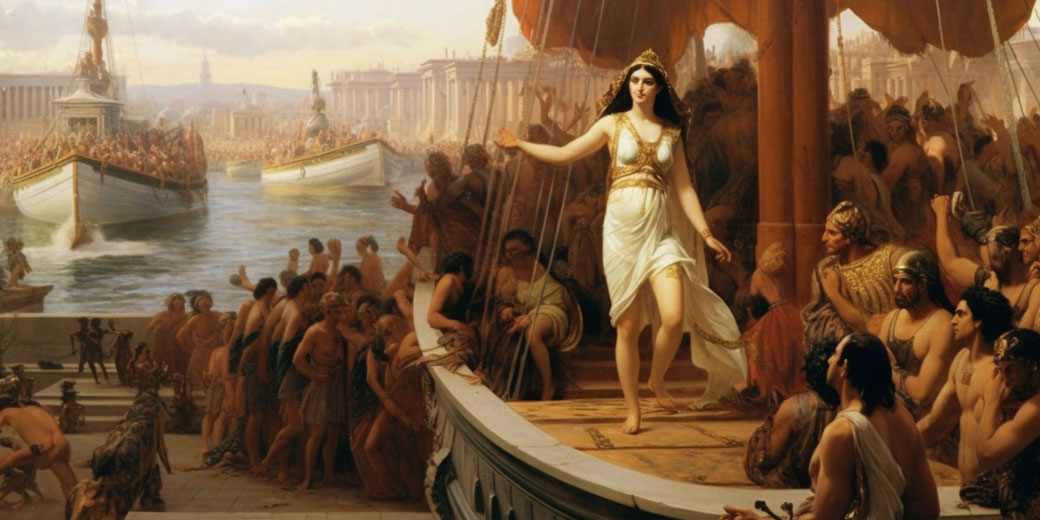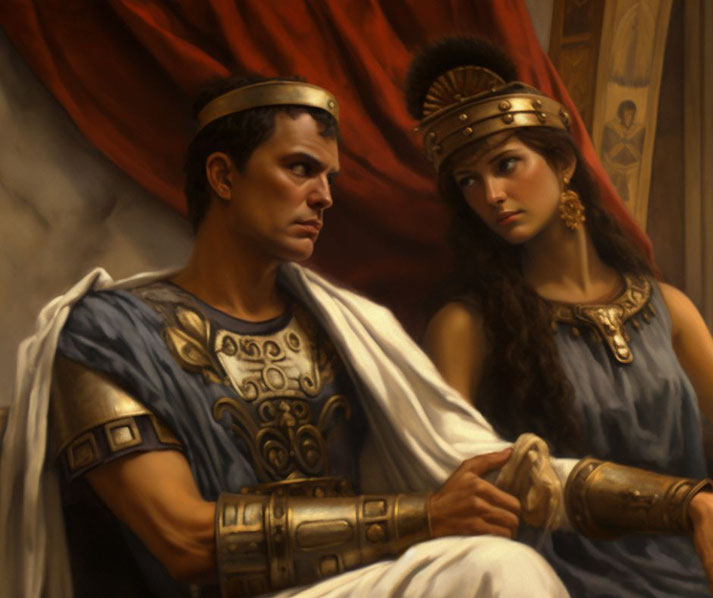When Cleopatra visited Ancient Rome with Julius Caesar, all hell broke loose

In the twilight years of the Roman Republic, a ship sailed into the heart of Rome, carrying a passenger whose presence would send ripples through the fabric of history.
She was no ordinary woman, but Cleopatra, the last active ruler of the Ptolemaic Kingdom of Egypt, a woman of unparalleled intellect, charisma, and political acumen.
As her ship docked and she set foot on Roman soil, the city held its breath. The stage was set for a series of events that would intertwine the destinies of Rome and Egypt, Julius Caesar and Cleopatra, forever altering the course of history.
But what brought Cleopatra to Rome?
What transpired during her time in this foreign land?
And how did the echoes of her visit reverberate through the rest of Roman history?
A clash of cultures and empires
Cleopatra VII, born in 69 BC, was the last active ruler of the Ptolemaic Kingdom of Egypt.
She ascended to the throne at a young age, sharing her early reign with her younger brother, Ptolemy XIII, whom she also married as per the Egyptian custom of royal sibling marriage.
Cleopatra was not just a queen; she was a highly educated woman, a shrewd politician, and a charismatic leader who could speak multiple languages.
Her reign, however, was fraught with political instability, familial conflicts, and the ever-looming threat of Roman intervention.
Egypt, during Cleopatra's time, was a wealthy and culturally vibrant kingdom, but it was also a state in decline, grappling with internal power struggles and external pressures.
The Ptolemaic dynasty was Greek in origin, and under their rule, Egypt had become a significant Hellenistic state and a leading cultural hub of the Mediterranean world.
However, the kingdom's independence was increasingly threatened by the expanding power of Rome, which had already subjugated several Hellenistic states by the time of Cleopatra's reign.

Meanwhile, Rome was undergoing its own political upheaval. The Roman Republic, which had been established in the 6th century BC, was in its twilight years.
Power was concentrated in the hands of a few influential individuals, among them Julius Caesar, a military general who had risen to prominence through a series of successful military campaigns.
Caesar was an ambitious man, seeking to consolidate his power and transform the republic into an empire.
His political maneuverings, however, had earned him many enemies within the Roman Senate.
Why did Cleopatra leave Egypt for Rome?
Cleopatra's journey to Rome in 46 BC was a significant event, not just in her life, but in the broader context of the ancient world.
It was a journey undertaken not merely for personal reasons, but with political and strategic objectives in mind.
Cleopatra was a shrewd ruler who understood the importance of alliances and the power dynamics of the time.
Her journey to Rome was a calculated move, aimed at securing her position as the ruler of Egypt and ensuring the survival of her kingdom in the face of the expanding Roman power.
The journey itself was a testament to the wealth and power of Egypt under Cleopatra's rule.
She did not travel alone but was accompanied by a large entourage, including her servants, advisors, and her young son, Caesarion.
The mode of travel was likely by sea, the most common and efficient means of long-distance travel in the ancient world.
The voyage would have taken them across the Mediterranean, from the shores of Egypt to the heart of the Roman Republic.
The journey was not without its challenges. Travel in the ancient world was fraught with risks, including unpredictable weather, potential pirate attacks, and the inherent difficulties of a long sea voyage.
However, Cleopatra was no stranger to adversity. She had already faced and overcome numerous challenges in her life and reign, and this journey was another obstacle to be surmounted in her pursuit of political stability and power.
How the Roman people reacted to her arrival
Cleopatra's arrival in Rome was a spectacle that captured the imagination of the Roman populace.
The city had seen many foreign dignitaries, but none quite like the Queen of Egypt. Her exotic beauty, her intelligence, and her charisma, coupled with her relationship with Julius Caesar, made her a figure of fascination and controversy.
Despite not being granted official state visitor status, Cleopatra was given accommodations in Caesar's villa in the Horti Caesaris, located on the right bank of the Tiber River.
This was a significant gesture, as it was a departure from the Roman tradition of housing foreign dignitaries in the state treasury.
It was a clear indication of the personal relationship between Cleopatra and Caesar, and it further fueled the rumors and speculations about their affair.
During her stay in Rome, Cleopatra was not a passive observer. She was an active participant in the social and political life of the city.
She attended social gatherings, engaged with Roman nobility, and used her charm and intelligence to win allies and influence people.
Her presence in Rome was a cultural event in itself, introducing the Romans to the customs, fashions, and traditions of Egypt.
This cultural exchange had a significant impact, leading to a fascination with Egyptian culture among the Roman populace, a trend known as "Aegyptomania".
Cleopatra's relationship with Julius Caesar was a central aspect of her time in Rome.
Caesar, despite his many enemies and the political tensions of the time, openly acknowledged Cleopatra as his consort and their son, Caesarion, as his own.
This was a bold move, as it was a departure from Roman tradition and it further complicated the already complex political scenario.

Cleopatra's role in the rising political tensions
Cleopatra's time in Rome coincided with the presence of some of the most influential figures in Roman history, including the famed orator and statesman, Marcus Tullius Cicero.
Cicero was a contemporary of Julius Caesar and a key player in the political landscape of Rome.
However, his interactions with Cleopatra were not particularly amicable.
Cicero's letters and writings provide some insight into his opinion of Cleopatra. He often referred to her in a derogatory manner and expressed disapproval of her relationship with Julius Caesar.
This was likely due to a combination of factors, including the political tension surrounding Caesar's increasing power, the controversy of Caesar's relationship with a foreign queen, and perhaps even a degree of cultural prejudice against the Egyptian monarch.
The circumstances around Caesar's assassination were a culmination of growing political tension in Rome.
Despite his successes and popularity with the Roman populace, Caesar had many enemies among the Roman Senate.
His relationship with Cleopatra, his increasing power, and his apparent desire to become a monarch were seen as threats to the Roman Republic and its traditions.
On the Ides of March (March 15) in 44 BC, a group of senators, including Brutus and Cassius, assassinated Caesar in the Senate house.
Cleopatra was still in Rome at the time of Caesar's assassination.

Her dangerous position following the assassination
The assassination of Julius Caesar in 44 BC marked a turning point in Cleopatra's visit to Rome.
The political landscape of the city was thrown into chaos, and the alliances and power dynamics that had been in place during Caesar's rule were suddenly upended.
In this volatile environment, Cleopatra made the decision to return to Egypt.
Her departure from Rome was not as grand as her arrival. The city was in turmoil, and the future of Rome was uncertain. Cleopatra, however, was a survivor.
She had navigated the complexities of Roman politics, secured alliances, and left a lasting cultural impact.
Now, she had to return to her own kingdom and face the challenges that awaited her there.
Back in Egypt, Cleopatra resumed her rule with renewed vigor. She declared her son Caesarion as her co-ruler, reinforcing her claim that he was the son of Julius Caesar.
This move was not only a political strategy but also a way to ensure the continuation of her dynasty.
Despite the political turmoil in Rome, Cleopatra managed to maintain Egypt's independence and even expand her kingdom's influence during her subsequent reign.
However, the aftermath of Caesar's assassination and Cleopatra's departure from Rome had lasting effects on the Roman Republic.
The power vacuum left by Caesar's death led to a period of civil war, which ultimately resulted in the end of the Roman Republic and the rise of the Roman Empire under Caesar's adopted heir, Octavian, later known as Augustus.
Cleopatra's relationship with Rome did not end with her departure. She later formed an alliance with Mark Antony, one of Caesar's allies, which once again put her at the center of Roman politics.
However, this alliance would eventually lead to a conflict with Octavian, culminating in the war that led to Cleopatra's downfall and the annexation of Egypt by Rome.
What do you need help with?
Download ready-to-use digital learning resources
Copyright © History Skills 2014-2024.
Contact via email
With the exception of links to external sites, some historical sources and extracts from specific publications, all content on this website is copyrighted by History Skills. This content may not be copied, republished or redistributed without written permission from the website creator. Please use the Contact page to obtain relevant permission.





